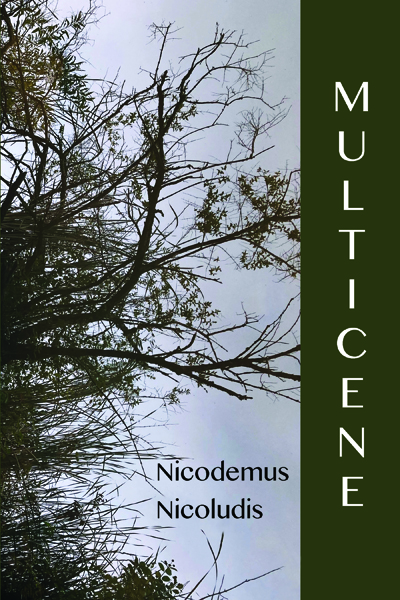Review: Nicodemus Nicoludis’ MULTICENE
Daniel Barbiero
November 2023
MULTICENE by Nicodemus Nicoludis
Arteidolia Press, November 2023
Multicene, the title of Nicodemus Nicoludis’ first collection of poetry, suggests the complexity of the human interface with the natural world, a world of which humans are a deeply connected part.
In Multicene, this connection reveals itself most starkly in the consequences of human demands on the earth’s various biomes. Because Nicoludis’ underlying concern is over the loss or destructive alteration of natural habitats, the overall tone of the collection is elegiac. What is being lamented here isn’t an individual death, but the potential death of the complex planet-wide system that supports all life.
Specifically, Nicoludis notes the negative effects that humans, through commerce, consumption, or ignorance, or some combination of the three, have had on the natural world. He observes that this doesn’t take place all at once; it happens over the course of centuries as human habitation encroaches on wild spaces, extracts what it can from them, recedes, and encroaches again:
Patience is a luxury
as I lay further into
northern New Hampshire
wealthy and wooded
Once mostly farm fields
now new growth forest
and abandoned lumber mills
turned townhouses
At the same time that he highlights the ruinous effects of the human presence, he acknowledges that ruin is one half of the cycle of creation and destruction, which itself is embedded in the universal law of transience that rules in the natural world:
Time is made
of this kind of afternoon quickness
tenderly passing along this moment
and that one the way ants
or bees
discard their dead which in turn turns to
mushrooms
or other kinds of detritus
Time is Janus-faced; it inevitably destroys, but all the same, Nicoludis suggests that when taken as the event for an unstructured opening to the world, it can midwife a change in our understanding of what is and isn’t ultimately valuable: “We get closer to a revolution/when we start thinking/about time as pleasure/not commodity”
Despite the devastation and wastefulness he sees around him, Nicoludis finds hope as well, as for example when in “There is no perfection” he notes that
Even the poppies
growing under the subway tracks
between the MTA workers’ cars
find something worth living for
if only to produce more living
more orange for a season
or an evening
like a full moon birthing
itself from nothingness
from space
The collection’s center of gravity is the long poem “Weather,” which looks at this multifaceted phenomenon through its daily effects, its signaling of long-term change, its reduction to data, and even its role in human small talk. It is literally everywhere, playing a role in the lives of everything on earth:
Birds and other animals move by the weather.
Whole colonies
triggered
by minute shifts in weather.
The rise and fall of pressure
thinning raindrops pulsing out weather.
As Nicoludis reminds us, this essential envelope – this literal atmosphere – that surrounds us is “the pulse/of the world.”
If Nicoludis sees human activity as responsible for disturbing the earth’s ecological balance, he also is aware of the irony that it is through human and reflection and language that the natural world can come to a kind of self-consciousness whereby its past can be memorialized, its present acknowledged, and it needs spoken for. Poetry such as his is one way in which this speaking can be articulated. It provides the answer to the more-than-rhetorical question he poses in “I hold in my hands” —
How does
the poem
form from
catastrophe and wind?
For more INFO on MULTICENE
to LOOK inside and to ORDER a copy →
◊
Daniel Barbiero is a double bassist, composer, and writer in the Washington DC area. His reviews of poetry and essays have appeared in Heavy Feather Review, periodicities, Word for/Word, Otoliths, and Offcourse. He also writes on the art, music and literature of the classic avant-gardes of the 20th century as well as on contemporary work. His music reviews have been published in Perfect Sound Forever, Point of Departure, Avant Music News, and elsewhere. Barbiero has performed at venues throughout the Washington-Baltimore area and regularly collaborates with artists locally and in Europe. His graphic scores have been realized by ensembles and solo artists in Europe, Asia, and the US. He is the author of As Within, So Without, a collection of essays published by Arteidolia Press.

